| The Tribuna of the Uffizi | |
|---|---|
 | |
| Artist | Johan Zoffany |
| Year | 1772–1778 |
| Medium | Oil painting |
| Dimensions | 123.5 cm × 155.0 cm (48.6 in × 61.0 in) |
| Location | Royal Collection, Windsor Castle |
The Tribuna of the Uffizi (1772–1778) by Johan Zoffany is a painting of the north-east section of the Tribuna room in the Uffizi in Florence, Italy. The painting is part of the United Kingdom's Royal Collection.
Production
Beginning in 1764, the German-born painter Johan Zoffany received numerous commissions from the Hanoverian King George III and his consort, Queen Charlotte. The queen ordered Zoffany to paint "the Florence Gallery" (the Galleria degli Uffizi), for which the artist would be paid £300. In the summer of 1772, Zoffany left London for Florence, where he met Felton Hervey, an art collector and friend of the king and queen, who figures prominently in the painting. Zoffany worked on the painting through late 1777 and returned to England in 1779. By this time Hervey had died.
The painting depicts the Tribuna of the Uffizi, an octagonal gallery designed by Bernardo Buontalenti in 1584. The most important ancient and Renaissance works were displayed in this gallery in the 18th century, making it an essential highlight of the Grand Tour.
Artworks shown
Zoffany's picture is not a historical record of the works displayed in the tribuna in the 1770s. Rather, it is an epitome of the works in the Medici collections he felt to be most important. To accomplish that goal, several works from other rooms in the Uffizi and seven paintings from the Galleria Palatina in the Palazzo Pitti were transferred to the Tribuna. To accomplish this, Zoffany requested the assistance of George, 3rd Earl Cowper, who had emigrated to Florence and Sir Horace Mann, who served as British diplomatic representative in Florence to the Grand Dukes of Tuscany. Two pictures by Raphael which Earl Cowper owned and hoped to sell to George III, and the Earl are depicted in Zoffany's painting. The unframed Samian Sibyl on the floor, acquired for the Medici collection in 1777, was a pendant to Guercino's Libyan Sibyl, recently bought by George III, and its inclusion may have been intended as a compliment to him.

Paintings
| Zoffany's | Original | Author and title | Where | Current location |
|---|---|---|---|---|
 |
 |
Annibale Carracci, Venus with a Satyr and Cupids | Left wall | Uffizi, Florence |
 |
 |
Guido Reni, Charity | Left wall | Palatine Gallery, Pitti Palace, Florence |
 |
 |
Raphael, Madonna della seggiola | Left wall | Palatine Gallery, Pitti Palace, Florence |
 |
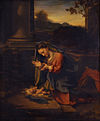 |
Correggio, Adoration of the Christ Child | Left wall | Uffizi, Florence |
 |
 |
Justus Sustermans, Portrait of Galileo Galilei | Left wall | Uffizi, Florence |
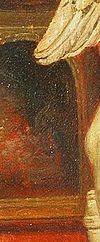 |
 |
After Rembrandt?, possibly a copy of the Holy Family with Saint Anne in the Louvre | Left wall | Unidentified |
 |
 |
Titian's workshop, Madonna and Child with Saint Catherine of Alexandria | Central wall | Uffizi, Florence |
 |
 |
Raphael and workshop, St John the Baptist | Central wall | Uffizi, Florence |
 |
 |
Guido Reni, Madonna | Central wall | private collection? |
 |
 |
Raphael, Madonna del cardellino | Central wall | Uffizi, Florence |
 |
 |
Rubens, The Consequences of War | Central wall | Palatine Gallery, Pitti Palace, Florence |
 |
 |
Franciabigio (formerly attributed to Raphael), Madonna del Pozzo | Central wall | Uffizi, Florence |
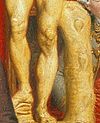 |
? | Central wall between the legs of the Satyr | Unidentified | |
 |
 |
Hans Holbein, Portrait of Sir Richard Southwell | Central wall | Uffizi, Florence |
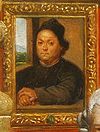 |
 |
Raphael, Portrait of Perugino | Central wall | Uffizi, Florence |
 |
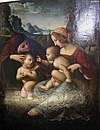 |
Perugino's workshop (Niccolò Soggi?), Madonna with Child, Saint Elizabeth and Saint John | Central wall | Uffizi, Florence, still in the Tribuna |
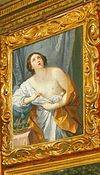 |
 |
Guido Reni, Cleopatra | Right wall | Palatine Gallery, Pitti Palace, Florence |
 |
 |
Rubens, The Four Philosophers | Right wall | Palatine Gallery, Pitti Palace, Florence |
 |
 |
Raphael, Pope Leo X with Cardinals Giulio de' Medici and Luigi de' Rossi | Right wall | Uffizi, Florence |
 |
 |
Pietro da Cortona, Abraham and Hagar | Right wall | Kunsthistorisches Museum, Vienna |
 |
 |
Bartolomeo Manfredi, Tribute to Caesar | Right wall | Uffizi, Florence |
 |
 |
Cristofano Allori, Hospitality of Saint Julian | Right wall | Palatine Gallery, Pitti Palace, Florence |
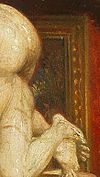 |
? | Right wall right of the Wrestlers | Unidentified | |
 |
Roman Charity? | Right wall | Unidentified | |
 |
? | Right wall behind the Venus | Unidentified | |
 |
? (a golden frame behind the man in red at the very right) | Right wall | ||
 |
 |
Raphael, Niccolini-Cowper Madonna | Lower part | National Gallery of Art, Washington |
 |
Guercino's workshop, Samian Sibyl | Lower part | Deposits of the Pitti Palace, Florence | |
 |
 |
Titian, Venus of Urbino | Lower part | Uffizi, Florence |
Sculptures and other
Many of the ancient sculptures painted by Zoffany can be identified, although few remain on their 18th century locations today. (The Medici's Roman statues stand in the main corridors of the Uffizi Gallery, except those which are still in the Tribuna. The smaller works are now in the collections of the Museo Archeologico Nazionale and the Museo Bargello in Florence).
| Zoffany's | Original | Author and title | Where | Current location |
|---|---|---|---|---|
 |
 |
Bust of a young woman, previously known as Plautilla | Left shelf | Uffizi Gallery, Florence |
 |
 |
Bust of a young man, previously known as Geta | Left shelf | Uffizi Gallery, Florence |
 |
 |
Bust of a woman | Left shelf | Museo degli Argenti, Florence |
 |
 |
Ancient Roman bust of a Julio-Claudian woman, previously known as Livia (?) | Left shelf | Villa Corsini a Castello, Florence |
 |
 |
Ancient Roman bust of Augustus | Left shelf | Museo degli Argenti, Florence |
 |
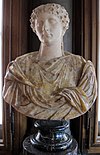 |
Bust of Agrippina Minor | Left shelf | Uffizi Gallery |
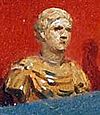 |
 |
Bust of Augustus | Left shelf | Museo degli Argenti, Florence |
 |
 |
Ancient Roman art, Venus of Aphrodisias | Left shelf | Villa Corsini a Castello, Florence |
 |
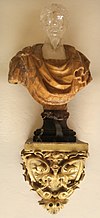 |
Bust of a man in antique style | Left shelf | Museo degli Argenti, Florence |
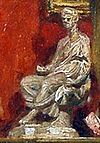 |
Seated man (?) | Central shelf | ||
 |
 |
Ancient Roman Seated God | Central shelf | National Archaeological Museum, Florence |
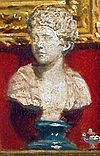 |
Bust of young Caracalla | Central shelf | Uffizi Gallery | |
 |
Hardstone footed cup | Central shelf | ||
 |
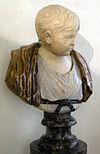 |
Bust of a boy, previously known as the young Nero | Central shelf | Uffizi Gallery, Florence |
 |
 |
Ancient Roman small bust of an Augustus (?) | Central shelf | National Archaeological Museum, Florence |
 |
 |
Bust of Zeus-Serapis | Central shelf | Villa Corsini a Castello, Florence |
 |
Bronze statuette | Central shelf | ||
 |
Bust of a man (?) | Central shelf | ||
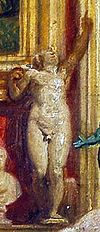 |
 |
Cupid with the bow | Central shelf | Uffizi Gallery, Florence |
 |
 |
Ancient Roman bronze statuette of Heracles | Right shelf | National Archaeological Museum, Florence |
 |
Bust of a man (?) | Right shelf | ||
 |
Canopic jar (?) | Right shelf | ||
 |
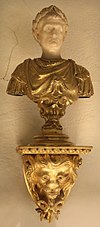 |
Bust of Nerva | Right shelf | Museo degli Argenti, Florence |
 |
 |
Bertoldo di Giovanni, Putto playing the lute | Right shelf | Bargello, Florence |
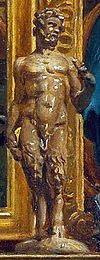 |
 |
Ancient Roman statuette of Satyr | Right shelf | Villa Corsini a Castello, Florence |
 |
 |
Seated Concordia | Right shelf | National Archaeological Museum, Florence |
 |
 |
Ancient Roman bust of a Young Satyr | Right shelf | Villa Corsini a Castello, Florence |
 |
 |
Ancient Roman art after Lysippus, Heracles and the Nemean Lion | Right shelf | Hermitage, St. Petersburg? |
 |
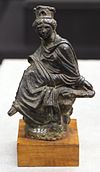 |
Seated Tyche of Anthioch | Right shelf | National Archaeological Museum, Florence |
 |
Bust of Bacchus (?) | Right shelf | ||
 |
 |
Ancient Roman art, Cupid and Psyche | Center | Uffizi, Florence |
 |
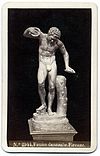 |
Ancient Roman art, Dancing Faun | Center | Uffizi, Florence, still in the Tribuna |
 |
 |
Jacopo Antelli (Monicca) and Jacopo Ligozzi, Octagonal table with Pietre Dure mosaics | Center | Uffizi, Florence, still in the Tribuna |
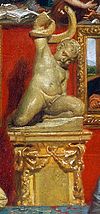 |
 |
Ancient Roman art, Baby Hercules strangling the snake | Center | Uffizi, Florence, still in the Tribuna |
 |
 |
Ancient Roman art, The Two Wrestlers | Center | Uffizi, Florence, still in the Tribuna |
 |
 |
Cleomenes, Medici Venus | Center | Uffizi, Florence, still in the Tribuna |
 |
 |
Baltimore Painter, Apulian krater with Amazonomachy | Lower part | National Archaeological Museum, Florence |
 |
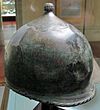 |
Etruscan bronze helmet with "button" on top | Lower part | National Archaeological Museum, Florence |
 |
 |
Ancient Roman art, Arrotino | Lower part | Uffizi, Florence, still in the Tribuna |
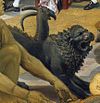 |
 |
Etruscan (with 17th-century implements), Chimera of Arezzo | Lower part | National Archaeological Museum, Florence |
 |
 |
Andrea Briosco workshop, Lamp in the shape of a Twisting Man | Lower part | Bargello, Florence |
 |
 |
Plate (missorium) of F. Ardaburius Aspar', Roman, c.. 434 AD | Lower part | National Archaeological Museum, Florence |
 |
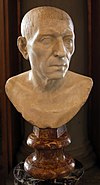 |
Bust, previously known as Cicero | Lower part | Uffizi Gallery |
 |
 |
Florentine pseudo-antique art, second half of the 16th century, Bronze head of Antinous | Lower part | National Archaeological Museum, Florence |
| Bronze lamp (?) | Lower part | |||
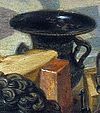 |
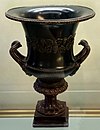 |
Bucchero Etruscan krater | Lower part | National Archaeological Museum, Florence |
 |
 |
Bucchero Etruscan oinochoe | Lower part | National Archaeological Museum, Florence |
 |
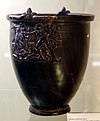 |
Bucchero Etruscan situla | Lower part | National Archaeological Museum, Florence |
 |
 |
Ancient Greek art, Livorno Torso | Lower part | National Archaeological Museum, Florence |
 |
 |
Ancient Egyptian art, Cube statue of Ptahmose | Lower part | National Archaeological Museum, Florence |
 |
 |
Etruscan funerary urn probably made in Volterra | Lower part, under the Venus of Urbino | National Archaeological Museum, Florence |
Persons shown
The Tribuna of the Uffizi combines aspects of the British 18th-century conversation piece, or informal group portrait, with that of the predominantly Flemish 17th-century tradition of Wunderkammer and gallery views. Thus, the figures populating Zoffany's painting are all identifiable as connoisseurs, diplomats and visitors to Florence. The inclusion of so many recognisable portraits was criticized by Zoffany's royal patrons, and by Horace Walpole, who called it "a flock of travelling boys, and one does not know nor care whom."
The first group of people is centered around the Niccolini Madonna by Raphael. From left, standing up, there are the picture's owner George, 3rd earl of Cowper, Sir John Dick, baronet of Braid, Other Windsor, 5th Earl of Plymouth, and Johan Zoffany, the painter himself, followed on the other side of the painting by Mr. Stevenson and his companion George Legge, 3rd Earl of Dartmouth, while is sitting on a chair Charles Loraine Smith and behind him, bended, Richard Edgcumbe, later 2nd Earl of Mount Edgcumbe.
Two more connoisseurs are near the Satiro. The first is reported to be Joseph Leeson, 2nd Earl of Milltown, even if his portrait does not match in age and resemblance those in the National Gallery of Ireland by Pompeo Batoni, and Valentine Knightley of Fawsley.
Further to the center of the painting Pietro Bastianelli, curator of the Uffizi Gallery, shows the Venus of Urbino by Titian to John Gordon, Thomas Patch who is apparently the man touching the Venus, but pointing to the figure of a male nude (believed to be a reference to Patch's homosexuality), Sir John Taylor and Sir Horace Mann. The sitting man, looking back towards, is the Hon. Felton Hervey.
The group around the Medici Venus include John Finch, Mr. Wilbraham (one of the sons of Roger Wilbraham of Nantwich), Mr. Watts, Mr. Doughty and, on the other side, Thomas Wilbraham (the second son) and James Bruce.
| Detail | Portrait | Name | Note |
|---|---|---|---|
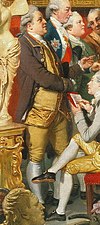 |
 |
George, 3rd Earl Cowper | |
 |
 |
Sir John Dick baronet of Braid | |
 |
Other Windsor, 5th Earl of Plymouth | ||
 |
 |
Johann Zoffany | the author of painting (self-portrait) |
 |
Mr. David Stevenson | tutor to Lord Lewisham | |
 |
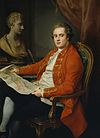 |
George Legge, 3rd Earl of Dartmouth | |
 |
Charles Loraine Smith | painter | |
 |
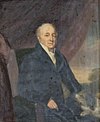 |
Richard Edgcumbe, later 2nd Earl of Mount Edgcumbe |
|
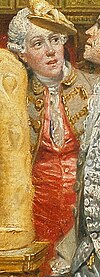 |
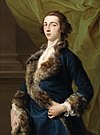 |
Joseph Leeson, 2nd Earl of Milltown | is reported to be, even if his portrait does not match in age and resemblance those in the National Gallery of Ireland by Pompeo Batoni |
 |
Valentine Knightley of Fawsley | also painter | |
 |
Pietro Bastianelli | curator of the Uffizi Gallery | |
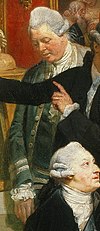 |
John Gordon | ||
 |
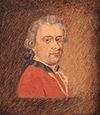 |
Thomas Patch | probably the man touching the Venus |
 |
Sir John Taylor | ||
 |
 |
Sir Horace Mann | |
 |
 |
Hon. Felton Hervey | |
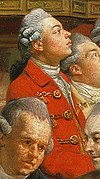 |
John Finch, 9th Earl of Winchilsea | ||
 |
Mr. Wilbraham | (one of the sons of Roger Wilbraham of Natwich) | |
 |
Mr. Watts | ||
 |
Mr. Doughty | ||
 |
Thomas Wilbraham | (the second son) | |
 |
 |
James Bruce |
See also
- A Modern Picture Gallery, an 1824 painting by William Frederick Witherington
Footnotes
- This painting was owned by Zoffany at the moment: this explains its prominence.
- Described in contemporary Italian newspapers as "Mr. Gordon, an English official".John Chambers wrote in 1829 that Rev. William Gordon of Saxlingham possessed several paintings "collected by John Gordon, who figured in Zoffany's picture of the Gallery of Florence".
References
Sources
- "The Tribuna of the Uffizi". Royal Collection.; text adapted from
- Shawe-Taylor, Desmond (2009). The Conversation Piece: Scenes of Fashionable Life. London: Royal Collection Publications. ISBN 978-1905686070.
- Pressly, William L. (March 1987). "Genius Unveiled: The Self-Portraits of Johan Zoffany". The Art Bulletin. 69 (1): 88–101. doi:10.1080/00043079.1987.10788404. ISSN 0004-3079.
- Nicholls, John Anthony (2006). Das Galeriebild im 18. Jahrhundert und Johann Zoffanys "Tribuna" (PDF) (Ph.D. thesis) (in German). Bonn University.
- Diagram with key to works and people, reproduced in Farber, Allen (Spring 2014). "The Gentlemanly Hang: Johann Zoffany, The Tribuna of the Uffizi, 1772-78". ARTH 200 Assignments: Authoritative and Disciplined Discussions of Masterpieces. SUNY Oneonta.
Citations
- ^ Royal Collection from Shawe-Taylor 2009
- ^ "The Hon. Felton Hervey (1712–1775)". National Trust Collections. National Trust. Retrieved 15 April 2017.
- Lewis, W.S., ed. (1967). "To MANN, Friday 12 November 1779". The Yale edition of Horace Walpole's correspondence. Vol. 24. Yale: Lewis Walpole Library. pp. 526–7. Retrieved 15 April 2017.
- ^ Cited in Nicholls 2006, p.152
- Chambers, John (1829). "Hundred of Henstead". A General History of the County of Norfolk, Intended to Convey All the Information of a Norfolk Tour. Vol. II. Norwich: John Stacy. pp. 759–760. Retrieved 15 April 2017.
- "BBC Two - Mary Beard's Shock of the Nude, Series 1, Episode 1".
| Johan Zoffany | |
|---|---|
| Paintings |
|
| Related |
|


